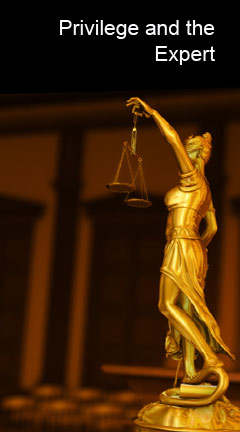Archival Notice
This is an archive page that is no longer being updated. It may contain outdated information and links may no longer function as originally intended.
Home | Glossary | Resources | Help | Course Map
Privileged communications refer to the exchange of information between individuals in a confidential relationship. The general purpose of categorizing certain communications as privileged is to encourage uninhibited, open discourse between persons. There are both common law and statutory privileged communications.
Statutory privileges exist in many jurisdictions for limited classes of communication. Communications between doctors and patients, attorneys and clients, and lawful religious leaders and their parishioners are privileged. Husband-wife communications, with certain limitations, are privileged. In some jurisdictions, client communications with certified public accountants are protected. That basically covers instances of statutory and common-law privileged communications.
Certain privileges or confidentiality rules exist for consultants, but not for examining, active or testifying experts. Courts have recognized an expert consultant's role as subject to technical advisor privilege.
(Sources: Wigmore, Wigmore on Evidence, §2301 at 583 (1961); People v. Lines, 13 Cal.3rd 500, 119 Cal. Rptr. 224, 531 P.2d 793 (1975); see also Criminal Justice Mental Health Standards §7-3.3(b) (1984) and Testimonial Privileges § 1:26 (updated June 2009).)
Attorney work products — what the attorney's thoughts are during preparations for trial — are privileged and cannot be reached by opposing counsel during discovery. (Source: Hickman v. Taylor, 329 U.S. 495, 91 L.Ed. 451, 67 S. Ct. 385.)
The courts have refined the work-product privilege to include the lawyer's refinement of information, sifting of data, legal theories and strategic plans. These products are not subject to discovery. However, no such privilege accompanies the expert's thought processes for trial preparation.
In general, the presence of a third party at a conference that would otherwise be privileged (i.e., lawyer and client only) breaks the privilege. The issue is thus whether the presence of the expert will destroy the privilege. The fine line seems to be between the expert's role as a consultant for the attorney, in which case privilege may still hold, and his role as an active investigating or testifying expert, in which case it probably will not hold.
The expert's task is to maximize the possibility that his communication will be subject to the retaining attorney's work product or other privilege to avoid or prevent it from being reached by opposing counsel during discovery.
Why worry about privilege? Why are there things an expert would not want the opposition to know? The reasons are the same as those that attend other confidential communications:
- The expert's work may potentially involve delicate or personal matters that have no bearing on his assignment in the current case.
- The expert may explore various theories or hypotheses, some of which will be discarded along the way.
- In addition, modern rules of discovery usually flush out all relevant information about current applicable areas of inquiry.
Additional Online Courses
- What Every First Responding Officer Should Know About DNA Evidence
- Collecting DNA Evidence at Property Crime Scenes
- DNA – A Prosecutor’s Practice Notebook
- Crime Scene and DNA Basics
- Laboratory Safety Programs
- DNA Amplification
- Population Genetics and Statistics
- Non-STR DNA Markers: SNPs, Y-STRs, LCN and mtDNA
- Firearms Examiner Training
- Forensic DNA Education for Law Enforcement Decisionmakers
- What Every Investigator and Evidence Technician Should Know About DNA Evidence
- Principles of Forensic DNA for Officers of the Court
- Law 101: Legal Guide for the Forensic Expert
- Laboratory Orientation and Testing of Body Fluids and Tissues
- DNA Extraction and Quantitation
- STR Data Analysis and Interpretation
- Communication Skills, Report Writing, and Courtroom Testimony
- Español for Law Enforcement
- Amplified DNA Product Separation for Forensic Analysts


